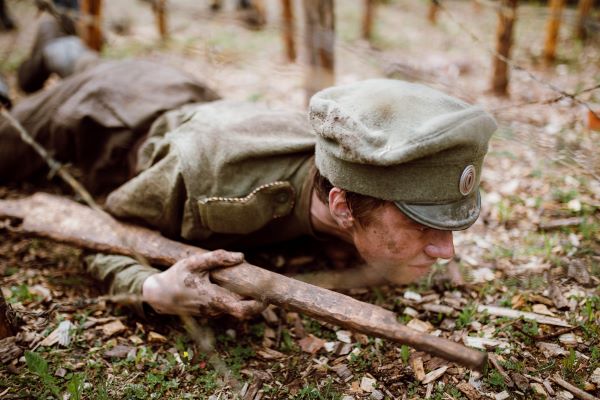
It is hard to know what to make of Blizzard of Souls, which is Latvia’s current entry for the Best International Feature Film Academy Award, and is the country’s highest grossing film in years. On one hand, it is engaging, beautifully shot, ambitious in scope, and there are striking details in many scenes. Yet it also displays an uneasy mix of gritty realism and heart-tugging romanticism, and we have the feeling that, in spite of its range, much is glossed over.
It is an old-fashioned war film, one that embraces patriotism with a vigorous hurrah, which is satisfying if you are not in the mood for anything especially complex. Yet the history this film unearths leaves one hungry for a fuller treatment. The history in question is that of Latvia from World War I, when it was part of Russia, to the country’s war for independence, which ended in 1920 with a Latvian victory.
Sixteen-year-old Arturs (Oto Brantevics) joins the Imperial Russian Army with his brother and father (Martins Vilsons) after his mother is killed by Germans soldiers. He’s not old enough, he barely seems to have processed what has happened to him, but his father, a veteran, pulls some strings and gets him enlisted.
Like many young men going off to war, Arturs has no idea what he’s in for. His journey is partially that of a young innocent boy who grows into a war-scarred young man who comes out in one piece, with honors. The film sees him through many battles, war wounds, several sweethearts, and, most significantly, several wars until his country is finally allowed both peace and independence.
The war film aims for nothing if not an epic sweep. Its score, perhaps too present, reaches immediately for the heart and seeks to add a dramatic flourish to romantic and frightening events. Sometimes the snowy landscapes and the war-torn vistas are captured with dreamlike photography, which is, to an extent, at odds with the brutish violence of the battles that take place there. Nevertheless, these sequences are genuinely suspenseful, the violence is disturbing, and these flourishes stir the heart, even if the director’s eyes might be more on Hollywood than on realism.
This film is based on a 1934 novel by Aleksandrs Grins, and it might have fared better as a TV adaptation like Band of Brothers. A mere two hours does not feel quite long enough to encapsulate all the events, both fictional and historical, that take place. Even if battle sequences are expansive, and if some scenes between Arturs and his sweetheart Marta (Greta Trusina) are poignantly observed, it feels as though we are flying through time. The Soviet offensive against Latvia and the following revolution (events American audiences may not be familiar with) happen so quickly that one almost doesn’t notice World War I ending. Yet the history is clearly fascinating, and it is thrilling to view the familiar past through the eyes of a country overlooked in the movies. It is therefore ultimately disappointing when the movie comes to its classically patriotic close, like something lifted from a Hollywood war film.
Yet some of the strongest passages occur when the director observes the soldiers in moments of casual camaraderie and downtime. In a hospital for the wounded, music and dancing breaks out, even among those severely injured, when it is announced that it is Easter, and a house of pain becomes one of celebration. This story could possibly have become a cornucopia of such moments if it had been given more room.
















Leave A Comment